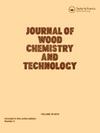Study on water resistance improvement of wood dowel rotation welding joints
IF 1.7
4区 农林科学
Q2 MATERIALS SCIENCE, PAPER & WOOD
引用次数: 0
Abstract
Abstract Rotation welding of wood dowels has the advantages of high bonding strength, fast processing speed and green environmental protection, and is suitable for jointing nodes in furniture and wood products. However, most wood friction welding specimens have poor water resistance where the welded joints are more likely to be damaged in wet environments, which greatly limits their wider application. Previous studies focused on using natural and green materials or methods to enhance bonding strength and water resistance of friction-welded joints. This paper reveals an innovative chemical pretreatment method to improve the water resistance of rotary friction welded joints by treating the substrate blocks or dowels with reagents that successively oxidize and sulfonate the wood, and spraying the dowels with Zinc acetate alcohol solution that has a lubricant effect, followed by friction welding. The findings show that both the dry bonding strength of friction welded joints and the wet bonding strength after impregnation with cold, hot, and boiling water of dowels pretreated with oxidation and sulfonation reactions were higher than those without pretreatment and significantly superior to the traditional polyvinyl acetate (PVAc) adhesive bonding. Graphical Abstract提高木榫旋转焊接接头耐水性的研究
摘要木榫旋转焊具有粘接强度高、加工速度快、绿色环保等优点,适用于家具和木制品节点的焊接。然而,大多数木材摩擦焊试件的耐水性较差,焊接接头在潮湿环境中更容易损坏,这极大地限制了其更广泛的应用。以往的研究主要集中在使用天然绿色材料或方法来提高摩擦焊接接头的结合强度和耐水性。本文提出了一种创新的化学预处理方法,通过对基材块或销子进行连续氧化和磺化处理,并在销子上喷涂具有润滑作用的醋酸锌醇溶液,然后进行摩擦焊接,从而提高旋转摩擦焊接接头的耐水性。结果表明:经氧化和磺化反应预处理的木钉经冷、热、沸水浸渍后的摩擦焊接头干键强度和湿键强度均高于未进行预处理的木钉,明显优于传统的聚醋酸乙烯酯(PVAc)胶粘剂。图形抽象
本文章由计算机程序翻译,如有差异,请以英文原文为准。
求助全文
约1分钟内获得全文
求助全文
来源期刊

Journal of Wood Chemistry and Technology
工程技术-材料科学:纸与木材
CiteScore
3.70
自引率
20.00%
发文量
37
审稿时长
3 months
期刊介绍:
The Journal of Wood Chemistry and Technology (JWCT) is focused on the rapid publication of research advances in the chemistry of bio-based materials and products, including all aspects of wood-based polymers, chemicals, materials, and technology. JWCT provides an international forum for researchers and manufacturers working in wood-based biopolymers and chemicals, synthesis and characterization, as well as the chemistry of biomass conversion and utilization.
JWCT primarily publishes original research papers and communications, and occasionally invited review articles and special issues. Special issues must summarize and analyze state-of-the-art developments within the field of biomass chemistry, or be in tribute to the career of a distinguished researcher. If you wish to suggest a special issue for the Journal, please email the Editor-in-Chief a detailed proposal that includes the topic, a list of potential contributors, and a time-line.
 求助内容:
求助内容: 应助结果提醒方式:
应助结果提醒方式:


